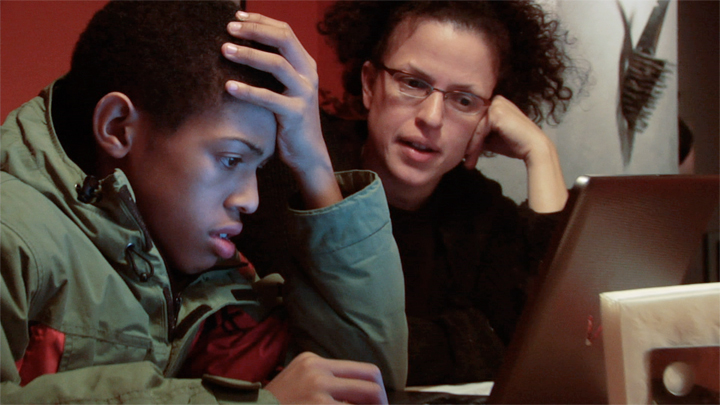
Filmmaker Michele Stephenson helps her son Idris with his homework in a scene from American Promise.
In this digital age, what’s the status update of America’s promise of an equal shot at education for all – for descendants of slaves as well as first-generation immigrants? Where does the pressure to get into and through college come from?
A new provocative documentary film explores these and other questions by following two middle-class African-American boys from the time they enter kindergarten in one of the country’s most elite private schools through high school graduation. Thirteen years in the making, American Promise premiered this month on PBS. Filmmaker Michele Stephenson visited WGBH this week to discuss the film.
The film captures heartbreaking moments, as Idris struggles with isolation in school, caught between two worlds. Filmmaker Michele Stephenson and her husband decided to make their son’s private experience public.
“Looking at this experience at this private school was a world that was really unique for us so as filmmakers and artists," Stephenson said. "We saw this as an opportunity to document this multi-cultural experience.”
The film follows another African-American boy, also from Brooklyn, who drops out of the Dalton and then lands in public school. At a time when many colleges have seen a decline in black enrollment, Stephenson said she wanted to explore the opportunities and obstacles in educational access at all levels.
“We have a long way to go. We must talk about race," Stephenson said. "We must talk about inclusion and inequity and what kind of visions of a society do we have for our families.”
The film shows Stephenson and other families confronting these conversations, together.
Even today in academia, talking about white racial privilege is often considered radioactive. In the making of her film, Stephenson encountered faculty at the Dalton School who talked about diversity fatigue.
According to Stephenson, the country can't afford to believe educational institutions are colorblind.
“There is a business cost. There is an economic cost. There is a social cost to all of us to perpetuating white privilege," Stephenson said. "There’s a cost to you and to me. It’s not about cutting a pie into smaller pieces. It’s about making the pie bigger and making sure that we all benefit.”
Stephenson said 'American Promise' is not just a one-off documentary, but an attempt to fuel a national conversation about eliminating the black male achievement gap.
Listen to On Campus reporter Kirk Carapezza's full interview with Stephenson here:
And watch the full film online here:










